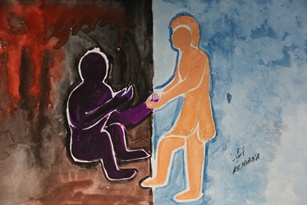 WHO Country Representative Dr Richard Peeperkorn delivers a speech at the World Health Day eventKabul 9 April 2017 – The Ministry of Public Health and WHO celebrated World Health Day at an event held in Kabul today to increase awareness and mobilize action around depression, a common mental health disorder and the leading cause of ill health and disability worldwide. According to latest WHO estimates, more than 300 million people are living with depression globally, an increase of more than 18% between 2005 and 2015. While accurate data on depression and mental health disorders is not available in Afghanistan, according to recent WHO estimates more than a million Afghans suffer from depressive disorders while over 1.2 million suffer from anxiety disorders. Actual figures are likely to be much higher.
WHO Country Representative Dr Richard Peeperkorn delivers a speech at the World Health Day eventKabul 9 April 2017 – The Ministry of Public Health and WHO celebrated World Health Day at an event held in Kabul today to increase awareness and mobilize action around depression, a common mental health disorder and the leading cause of ill health and disability worldwide. According to latest WHO estimates, more than 300 million people are living with depression globally, an increase of more than 18% between 2005 and 2015. While accurate data on depression and mental health disorders is not available in Afghanistan, according to recent WHO estimates more than a million Afghans suffer from depressive disorders while over 1.2 million suffer from anxiety disorders. Actual figures are likely to be much higher.
Depression affects people of all ages but the risk of becoming depressed is increased by multiple factors such as poverty, insecurity and conflict, unemployment, physical illness, gender-based violence and drug use. Depression causes mental anguish and impacts people’s ability to carry out even the simplest everyday tasks, with sometimes devastating consequences for relationships with family and friends and the ability to earn a living. At worst, depression can lead to suicide, now the second leading cause of death among 15-29-year-olds globally.
“The Ministry of Public Health has recently trained over 700 professional psychological counselors and 101 specialized mental health doctors. Of these, 300 are currently working in government-run health centres while the others are working for different health NGOs,” said H.E. Dr Ferozuddin Feroz, Minister of Public Health, speaking at the World Health Day event. “We need to fight the stigma and discrimination associated with depression and other mental health problems and ensure all people have access to help when they need it.”
 Samia Hamasi won 3rd place in a regional WHO art contest on the theme "depression"WHO has identified strong links between depression and other non-communicable disorders and diseases. Depression increases the risk of substance use disorders and diseases such as diabetes and heart disease and it is also an important risk factor for suicide.
Samia Hamasi won 3rd place in a regional WHO art contest on the theme "depression"WHO has identified strong links between depression and other non-communicable disorders and diseases. Depression increases the risk of substance use disorders and diseases such as diabetes and heart disease and it is also an important risk factor for suicide.
“Our campaign slogan for this year’s World Health Day is ‘Let’s Talk’. For someone suffering from depression, talking to a person they trust, whether it is a friend, family member or health worker, is often the first step towards treatment and recovery,” said Dr Richard Peeperkorn, WHO Country Representative. “There is an urgent need for increased investment towards supporting mental health interventions in Afghanistan to ensure support is available for people with mental health disorders. We need to treat mental health with the urgency it deserves.”
Depression is a common mental illness characterized by persistent sadness and a loss of interest in activities that people normally enjoy, accompanied by an inability to carry out daily activities, for 14 days or longer. In addition, people with depression normally have several of the following: a loss of energy; a change in appetite; sleeping more or less; anxiety; reduced concentration; indecisiveness; restlessness; feelings of worthlessness, guilt, or hopelessness; and thoughts of self-harm or suicide.
Afghan School Girl Wins 3rd Place in WHO EMRO Regional World Health Day Art Contest
 Samia's winning drawingSamia Hamasi, 17, from Kapisa province, won third place in a regional WHO art contest on this year's World Health Day theme "Depression". Her draving depicts a person pulling a friend from darkness to light.
Samia's winning drawingSamia Hamasi, 17, from Kapisa province, won third place in a regional WHO art contest on this year's World Health Day theme "Depression". Her draving depicts a person pulling a friend from darkness to light.
"My sister has suffered from depression so I know the signs and symptoms. For a long time she just wanted to stay in her dark room alone, not talking to anyone. My mother and I helped her and talked to her a lot and finally she got better. This is how I got the idea for the drawing - I was able to pull my sister back from the darkness to light," Samia said.
"In the future, my dream is to go to university and become a lawyer. I want to move back to my home province of Kapisa where I hope I can help women living there with their problems," she said.
The WHO Eastern Mediterranean Region includes 22 countries from which a panel of judges selected drawings, awarding Samia third place regionally in her age category.



